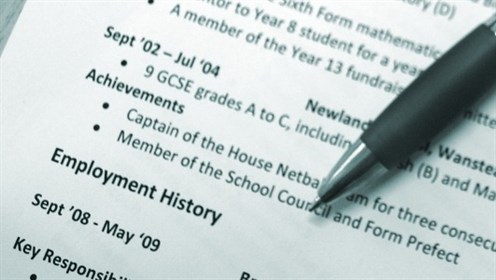Here are some helpful Tips and Tricks
WHAT DOES YOUR CV SAY ABOUT YOU?

Achievements
Listing achievements promotes not only that you made a strong
contribution, but also that you take pride in your work. Don't go
too overboard. 3 or 4 bullet points may suffice.
Paragraphs of text
Don't get read. Use short sentences and bullet points where
possible, particularly when describing duties and achievements.
Resumes tend to be scanned quickly before they are read thoroughly.
Make sure the important information is easy to find. If your resume
reads like "War & Peace" it won't be read. Edit!!!
1997 - Present
Be specific about dates (month specific) and make sure that you
keep this information current. Having three positions on your
resume that read to current is confusing and disconcerting. Are you
really holding down three full time jobs in three different states?
List experience in chronological order.
Font
At Stealth we have a particular aversion to Times New Roman. It's
been around since 1932 and it's certainly starting to show signs of
age. Try for a friendlier font; Arial is simple, classic and
available everywhere.
Bragging Nana
Your CV is all about what you have achieved. Try to think about
the way your grandmother speaks or would have spoken about your
achievements. This is the pride that should reveal itself in your
text.
Space Bar
The friend and the enemy. Using the spacebar between words and
sentences is fantastic. Using it to get from one side of the page
to another makes your resume about as unstable as a house made of
jelly. It may look fantastic on your computer, but when received
cannot be read. Use Tab and indents where possible.
INTERVIEW TIPS & TRICKS

DO
Do: Your Homework
Spend some time learning about the Company. What projects are
they working on? Who are their senior staff? Do they use any
specific language or jargon? Websites are a great source of
information and easy to access. Ask your Recruiter for information
on the client. Your recruiter should be able to answer technical
questions about the company you are being put forward to. Don't be
afraid to ask them the hard questions.
Do: Be On time
Where possible, aim to be 10 minutes early for an interview.
Introduce yourself kindly and confidently to reception and enjoy
some time to relax before you go in.
Do: Dress to impress
It's important to show your interviewer that you scrub up
well. Err on the conservative side. Suit and Tie is a classic
choice.
Do: Ask questions
Questions show that you are interested, that you have spent
time researching the company and that you are paying attention.
Don't be afraid to ask about your future with the company. It shows
that you would like to invest your career with them. Wait for a
pause in the interview and allow some time before becoming too
inquisitive, they may be getting to the answers.
Do: Sell Yourself!
You are there to show them that you are the right person for
this role. It is generally safe to say that the person who is
interviewing you has read your CV. Feel free to make reference to
this information but also build on it. Talk about specific examples
and how these skills and experiences make you the right person for
the role. Make sure that your Recruiter knows YOU well enough to
make informed statements on your behalf.
DON'T
Don't: Be negative about a former
employer
Don't: Respond with Yes and No answers
Don't: Use your mobile phone
Don't: Ramble
Don't: Focus on the Remuneration
DOING YOUR HOMEWORK

Being adequately prepared can make all of the difference. Here are
a few helpful hints on homework you can do to help you get your
ideal role:
Research the company
Make sure you know as much about the company as you can and
how they fit into the industry; expect to be asked why you want to
work with this company and what value you can bring to them.
Know your strengths and weaknesses
In your preparation, focus on your professional achievements,
summarise your strengths and be aware of your weaknesses, think
about how this could impact on the role you have applied for.
Review your resume again, think about the type of workplace in
which you have performed well; examine circumstances where things
have not gone so well and analyse why. You need to be confident in
your own abilities and knowledge and you need to be honest about
your capabilities.
Present yourself
Many times the client will conduct the first interview by
telephone and this gives you a short window to impress. Have the
relevant information with you about the job, the company, who you
are talking to and their roles in the company. Go to a quiet area
and make sure you have good telephone reception. Listen carefully
and talk clearly.
Think about your future
Give some serious thought to where you want to be in a few
years time and how this job fits into your overall plan. If your
objective is sitting on a beach and living off your investments,
it's probably not going to nail this opportunity for you.
Evaluate your responses
Try to anticipate the type of questions you will be asked and
how you will respond. The company representative will be interested
to know how you react/act in certain circumstances. Spend some time
thinking about what this job entails and the likely challenges you
will face. Go over your responses as part of your preparation for
the interview.